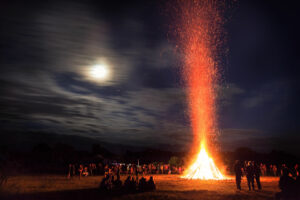The world, now fully awake after Ostara and Beltane, burns with the promise of a fulfilling summer season. The Summer Solstice on June 21st will be the longest day of the year. During these sunny hours of the day, many religions will bear witness to Midsummer, or, if you’re pagan, the sabbat Litha.

History of Litha
Countless cultures have observed the sun throughout centuries, noting the far-off star’s habits and eccentricities. Though there is no real known source as to how far back Midsummer traditions may go, ancient Celts, Romans, and Saxons all had various traditions related to the longest day of the year.
For Scandinavian cultures, the solstice was a reprieve from the usual dark days which come during the winter months. Midsummer marked the month of Juno (Hera) and Vesta (Hestia) for the Romans. Celebrations for these deities included salted meals and praising motherhood. Other folklore states that Litha is a day of battle between the Oak King (summer) and the Holly King (winter). Since the summer solstice is usually the longest and hottest day of the year, it represents the Oak King’s final hurrah before autumn and winter begin to creep upon us.
A common thread for all of these ancient traditions was the importance of fire. Bonfires were lit to ensure that even at night there was light to allow others to watch the sunrise. Modern-day practitioners of Litha continue on many of these older traditions, especially those interested in deity work. Bonfires have a peculiar mainstream significance thanks to films like “Midsommar”, which depicts a fictional Scandanavian celebration of Midsummer with a horrific twist. Despite the bad press, this may have given the celebration, many still incorporate bonfires into their traditional practices to witness the sabbat. As Midsummer is witnessed by various cultures all over the globe, there is little that can be said to tarnish the joy it brings others.

How to Prepare for Litha
Litha is a time for joyous celebration, feasts, and familial connection. To prepare for Litha, you must first decide how you wish to celebrate and with whom! If your wish is a more traditional bonfire ordeal, collect your closest friends and family and set off to collect all needed items. Bonfires on the beach are perhaps the safest way to celebrate, but be sure to check your local laws to ensure everything is done legally. You may also search for designated bonfire sites and do your celebration there! If fire is not your strong suit, a classic barbeque could suffice.
For smaller gatherings, a feast inside with your loved ones is perfect to draw in the spirit of the solstice. Altars can be prepared together as well in celebration, just be sure to feature colors like orange and yellow, summer fruits, sunflowers, and solar symbols. If feasts and gatherings are too much, then use the day to learn a new skill. Reading, relaxing, and taking in the sun are all valid ways to celebrate! In the end, do what makes you happiest on this solstice and you will in turn honor the sabbath!
Common Symbols of Litha
Litha features a plethora of symbols and botanicals that are necessary to know if you plan to celebrate.
Colors:
Litha thrives under the brilliant sun. Bright, summery colors like orange, red, and yellow all entice a feeling of the solstice in both decors and in instruments of the craft. Line your altar with these brightly colored candles to invite the warmth of summer into your workspace. Light blues and greens represent the sky and the rich greenery of summer, so living branches and sky-blue drinks are welcome additives to any gathering.
Like Ostara, black and white are also two very important tones as they symbolize the fight between light and dark. Burn a white candle to honor the Oak King. Once the sun has set, light a black candle to honor the Holly King and experience a smooth transition into the rest of the year.
Animals:
Butterflies, bees, and songbirds like robins, wren, and cardinals are all symbolic of the solstice. These critters come out in full force during the month of June in most climates and bring balance to the world through pollination. Honor the smaller parts of our ecosystem this solstice by laying out bird feed and planting local wildflowers!
Botanicals:
Oak and acorns represent the Oak King’s strength and vitality in the summer. Collect fallen leaves and seeds to adorn your living and workspaces. Herbs of importance include mugwort, rose, St. John’s wort, honeysuckle, lavender, thyme, and chamomile. If you plan to cook a Litha feast, consider using herbs like thyme or lavender to fully incorporate them into your honoring of the solstice.

Rituals for Litha
While Litha rituals can mainly be the time spent with loved ones, here are a few small spells to do if you wish to harness the power of the solstice this season.
Litha Sun Soak
Find the sunniest place you can set up and lay a towel or blanket. Bring a book if you want, or just your favorite tunes, and lay back beneath the warm sun. Soak in the rays for as long as you like and meditate on where you are in life and where your focuses lie. Consider if anything needs to be changed. When doing this ritual be sure to bring sunscreen! Witchery is fine and dandy, but sunburn is not! Practice safely beneath the solstice sun this season.
Cool Drinks for Litha
When it’s hot out, it’s only right to drink something cool and sweet! On Litha, make an effort to incorporate some symbolic herbs with summer staples. This Lavender Lemonade recipe is perfect for kids and adults alike and sure to brighten your day even without the bonfire! If you’ve got mainly adult friends to entertain, try this Chamomile Sangria recipe. The mix of bright fruit and calming camomile evokes a sense of balance and serenity in any who drinks it! Consider getting creative and finding more fruity, chilly, delicious drinks to prepare for you and your close ones!
Litha Green Gardens
Consider taking up gardening this season! From apartment rooms to front yards to even guerilla gardening— this Midsummer is a chance to pick up a new skill, so why not let it be cultivating a green thumb? Gardening with local greenery allows all of our favorite homestead pollinators to expand and ensure our ecosystem is well tended to. Plus, gardening fruits and vegetables offers you a way to cut costs at the grocery store. Pick up a book, a shovel, and a few starter plants and get to honoring Litha and Mother Earth in your own special way!
